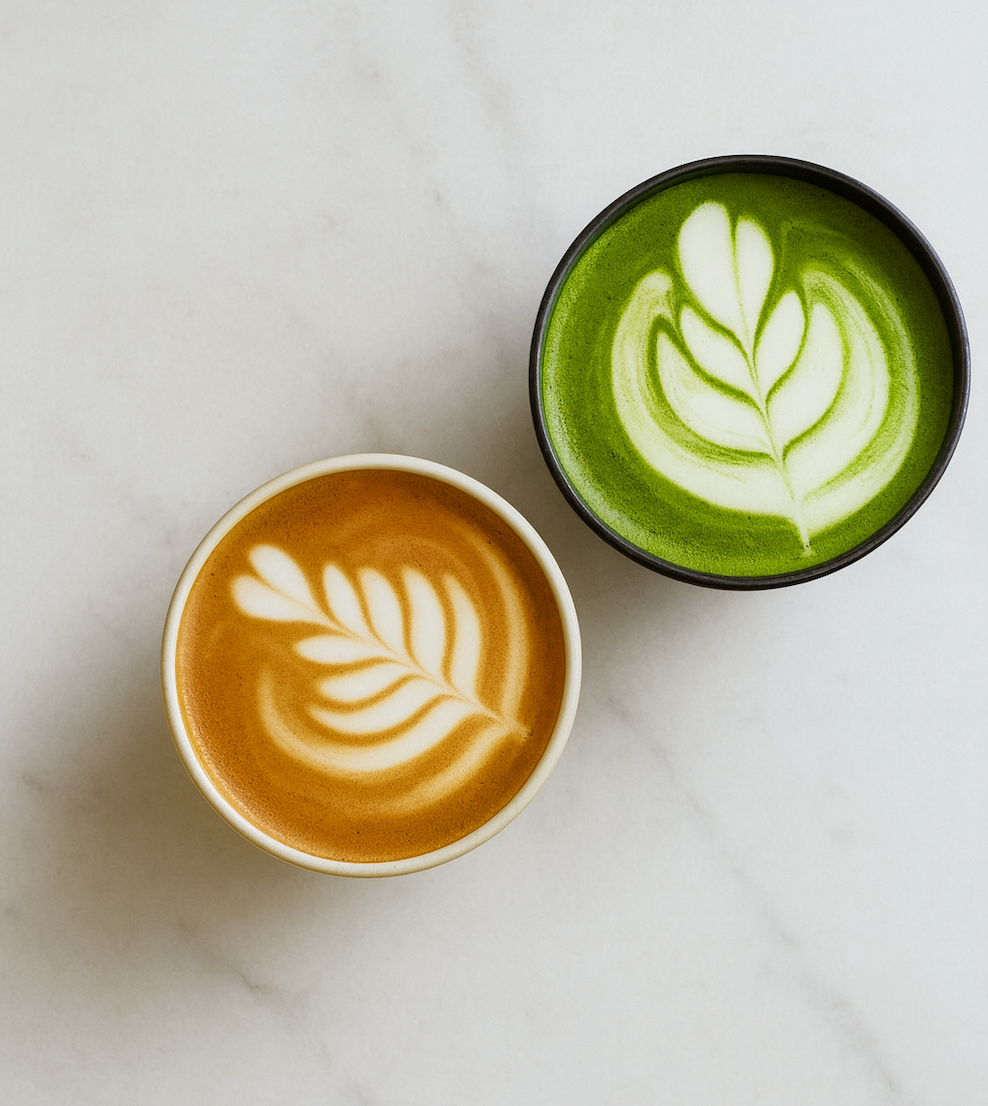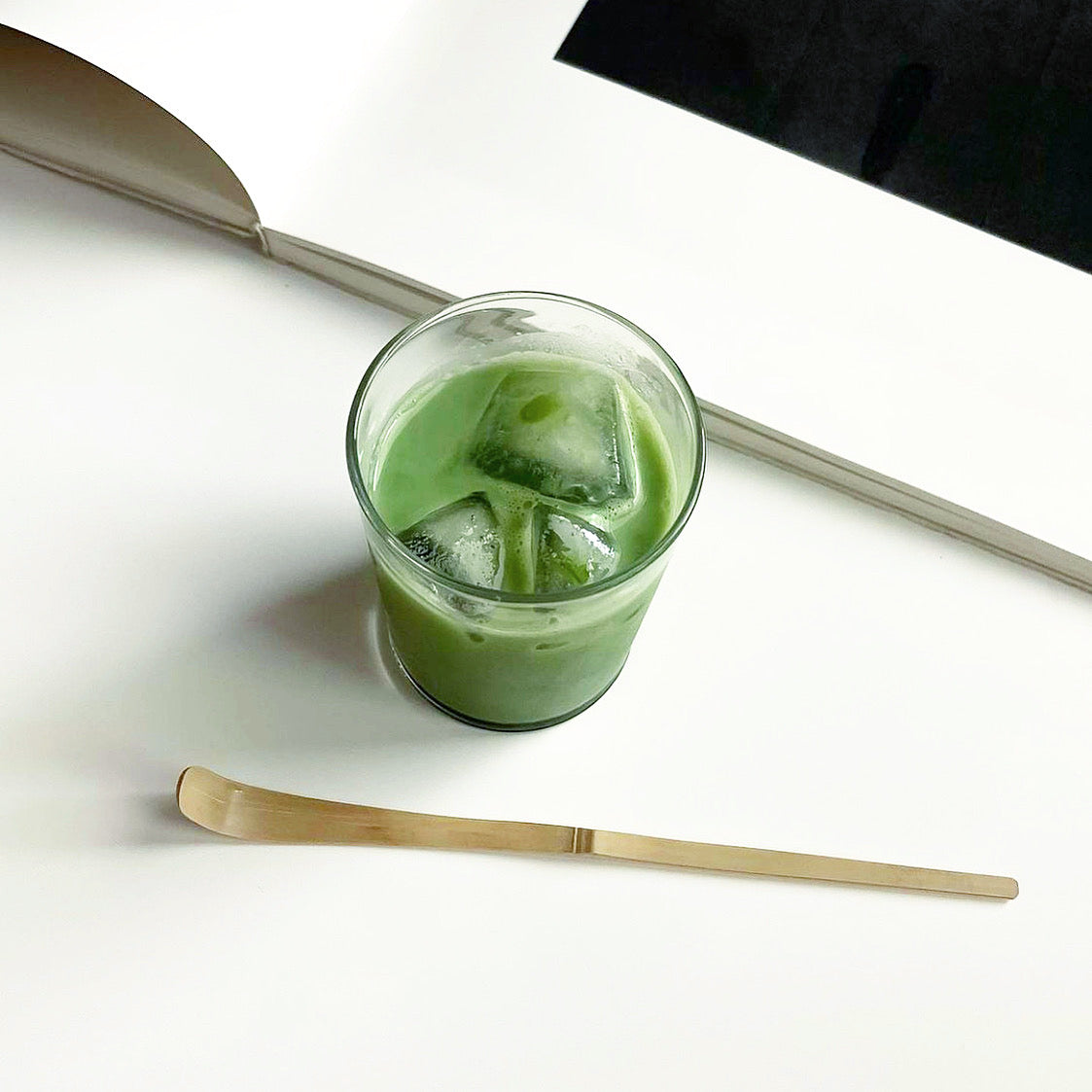

· By Maria F.
Matcha vs Coffee: Which is Better for Sustained Energy?
Tired of the afternoon coffee crash? There's a better way to fuel your day.
If you're questioning whether your coffee habit is serving you well, you're not alone. With matcha's surge in popularity, millions are discovering what could be the ultimate upgrade to their daily energy routine. But does matcha actually deliver better sustained energy than coffee, or is it just trendy hype?
Let's break down the science and give you the real answer.
The Energy Showdown: Sprint vs Marathon
Coffee: The Energy Sprint
Coffee hits fast and hard. That 95mg of caffeine in your morning cup floods your bloodstream within 15-30 minutes, delivering the familiar jolt you've come to depend on. But here's the catch: what goes up must come down.
By hour 3, you're likely experiencing the dreaded crash – that sudden drop in energy, focus, and mood that has you reaching for cup number two (or three). It's an energy roller coaster that leaves many people dependent on multiple cups throughout the day.
Matcha: The Energy Marathon
Matcha takes a completely different approach. With about 70mg of caffeine per serving, it delivers energy steadily over 3-6 hours without the peaks and valleys. The secret? L-theanine – a unique amino acid that creates what users describe as "calm alertness."
Instead of jittery energy, you get sustained focus. Instead of crashes, you get a gentle wind-down. It's energy designed for productivity, not dependency.
The Science That Changes Everything
L-Theanine: Matcha's Game-Changer
L-theanine is found almost exclusively in tea plants, with matcha containing the highest concentrations. This amino acid does something remarkable: it modulates caffeine's effects by:
- Promoting alpha brain waves (associated with calm focus)
- Preventing jitters and anxiety
- Creating sustained energy release
- Enhancing mental clarity without overstimulation
When L-theanine meets caffeine, magic happens. You get all the alertness benefits without the side effects.
The Release Pattern Difference
Coffee's caffeine: Absorbed rapidly → Peak in 30-60 minutes → Crash in 2-4 hours
Matcha's caffeine: Absorbed gradually → Sustained 3-6 hours → Natural fade
This isn't just theory – it's biochemistry. Coffee's free caffeine hits your system like a flood, while matcha's caffeine is naturally time-released through its unique plant compounds.
Hour-by-Hour Energy Comparison
| Time | Coffee Experience | Matcha Experience |
|---|---|---|
| 0-1 Hour | Rapid energy spike, possible jitters | Gentle, building alertness |
| 2-3 Hours | Peak alertness, feeling great | Sustained focus and clarity |
| 4-5 Hours | Energy declining, crash beginning | Still energized and focused |
| 6+ Hours | Crash complete, need another cup | Natural, comfortable wind-down |
Beyond Energy: The Health Bonus
Antioxidant Powerhouse
Matcha delivers 137 times more antioxidants than regular green tea. These catechins (especially EGCG) support metabolism, immune function, and cellular protection – benefits coffee simply can't match.
Digestive Friendly
While coffee can trigger acid reflux and stomach upset, matcha is alkalizing and gentle on your digestive system. The chlorophyll also supports natural detoxification.
Mental Health Support
Studies show matcha's L-theanine and moderate caffeine combination can reduce anxiety, improve mood stability, and support better stress management – crucial for today's demanding lifestyles.
Making the Switch: What to Really Expect
Week 1: The Adjustment
Your body might initially miss coffee's intense hit. Start with high-quality matcha in the morning and track your energy levels throughout the day. Most people are surprised by the sustained alertness.
Week 2-3: The Sweet Spot
This is when the magic happens. You'll likely notice you need less overall caffeine, experience fewer afternoon slumps, and feel more emotionally balanced.
Month 1+: The Transformation
Better sleep quality (despite the caffeine), improved stress response, and consistent daily energy become your new normal.
Quality Matters: Choosing Your Matcha
Not all matcha delivers these benefits. For optimal results:
✓ Choose ceremonial grade – Maximum L-theanine and nutrients
✓ Look for vibrant green color – Indicates proper processing
✓ Source from Japan – Traditional methods ensure quality
✓ Check organic certification – Cleaner, more potent product
✓ Store properly – Sealed and refrigerated maintains potency
The Real Talk: Which Wins?
For quick energy bursts? Coffee wins.
For sustained energy, mental clarity, health benefits, and freedom from crashes? Matcha dominates.
Here's what matcha users consistently report:
- 3-6 hours of steady energy vs coffee's 1-3 hours
- Enhanced focus without anxiety
- No afternoon crashes
- Better mood stability
- Improved overall well-being
Your 24-Hour Energy Upgrade Challenge
Ready to test this for yourself? Try this simple experiment:
Tomorrow: Replace your morning coffee with high-quality matcha
Track: Energy levels, mood, and focus every 2 hours
Notice: How you feel at 3 PM (traditional crash time)
Compare: Your overall day vs typical coffee days
Most people notice the difference within the first day.
The Bottom Line
Coffee built its reputation on quick fixes and energy dependency. Matcha offers something better: sustained vitality, mental clarity, and health benefits that compound over time.
You're not just switching beverages – you're upgrading your entire approach to daily energy. Instead of managing crashes, you're optimizing performance. Instead of needing more caffeine, you're working with your body's natural rhythms.
The question isn't whether matcha is better than coffee for sustained energy. The science is clear on that.
The question is: are you ready to experience what sustained, healthy energy actually feels like?
Start your transformation with premium ceremonial-grade matcha and discover why millions are making the switch from coffee crashes to sustained vitality.
Ready to make the switch? Explore our collection of premium ceremonial-grade matcha, sourced directly from Japan and perfect for sustained energy without the crash.
Individual results may vary. If you're pregnant, nursing, or have medical conditions, consult your healthcare provider before changing your caffeine routine.
Trending Articles
-

Marukyu Koyamaen: tres siglos dedicados al arte del matcha
Fundada en 1704 en Uji, Kyoto, Marukyu Koyamaen es una de las casas de té más respetadas de Japón. Su legado no se basa únicamente en el cultivo, sino en el trabajo de sus Tea Masters, quienes generación tras generación...
-

Lugares para tomar matcha en Japón: opiniones reales sobre la experiencia, los más tradicionales y los más virales
Si estás planeando un viaje a Japón y quieres probar matcha auténtico, este artículo te ayudará a descubrir los mejores lugares para tomar matcha en Tokyo, Kyoto y Uji, basado en nuestra experiencia personal. Aquí te contamos cuáles lugares no son...
-

Matcha Orgánico vs No Orgánico: ¿Cuál es Mejor?
Si estás buscando comprar matcha de calidad, probablemente te has preguntado: ¿vale la pena pagar más por matcha orgánico? En este artículo te explicamos las diferencias reales para que tomes la mejor decisión. ¿Qué Significa "Matcha Orgánico"? El matcha orgánico...



